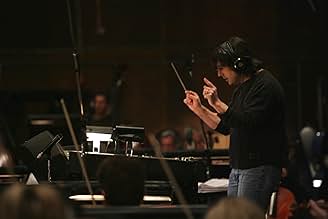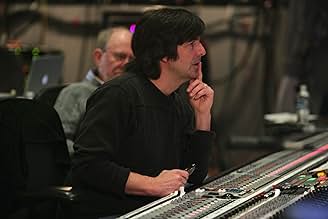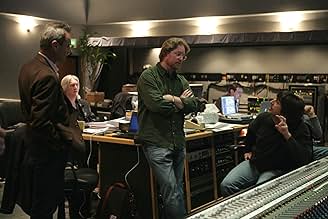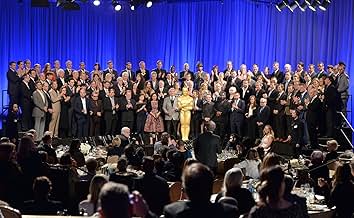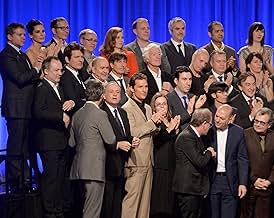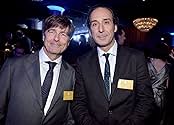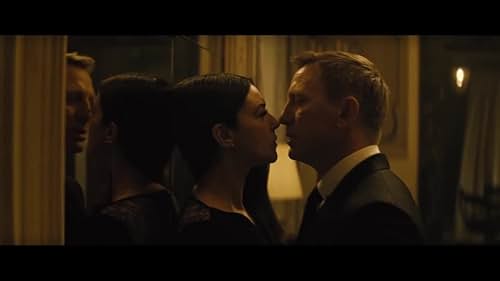Thomas Newman(I)
- Music Department
- Composer
- Soundtrack
Thomas Newman is an American film score composer. He was born in Los Angeles. His father was notable film score composer Alfred Newman (1900-1970). The Newman family is of Russian-Jewish descent, and includes several other well-known musicians. Thomas' mother Martha Louis Montgomery (1920-2005) wanted her sons to have a musical education. Thomas attended regular lessons in violin as a child. An older Thomas received his musical education while attending the University of Southern California and Yale University. Thomas Newman graduated as Bachelor of Arts in 1977, and a Master of Music in 1978.
Thomas originally composed music for theatrical productions in Broadway, working with his mentor Stephen Sondheim. His uncle Lionel Newman asked him to compose music for the television series "The Paper Chase" (1978-1979, 1986), which was Thomas' first credit in a television production.
In the 1980s, Thomas first worked in film. Composer John Williams, a close family friend, hired Thomas to work in the music department for space opera film "Return of the Jedi" (1983). Thomas' main work in the film was orchestrating the music in a scene where character Darth Vader dies. Afterwards, Thomas was approached by film producer Scott Rudin and hired to work as a film score composer in his own right. His first work in the field was the film score of romantic drama "Reckless" (1984).
While he worked regularly as a film score composer during the 1980s, Thomas reportedly felt he had to retrain himself for a hard and demanding job. It reportedly took him 8 years to not feel fraudulent in his efforts. In 1994, Thomas received his first Academy Award nominations, for the film scores of "The Shawshank Redemption" (1994) and "Little Women" (1994). He lost the Award to rival composer Hans Zimmer, who had been nominated for the film score of the animated film "The Lion King" (1994).
Newman was an established and increasingly famous composer in the 1990s. He received further Academy Award nominations, although he never actually won. Among his more notable works was the film score of the drama film "American Beauty" (1999), which earned Thomas both a Grammy and a BAFTA award. Newman had a good working relationship with the film's director Sam Mendes. Mendes has kept hiring Thomas as the composer for most of his films. The main exception being the comedy-drama film "Away We Go" (2009), which did not have a film score.
In the 2000s, Thomas continued working in high-profile films, such as "Road to Perdition" (2002), "Finding Nemo" (2003), and "Lemony Snicket's A Series of Unfortunate Events". By 2006, he had been nominated eight times for an Academy Award, while never winning it. He started joking about his lack of victories in public.
In 2008, Thomas was nominated for two Academy Awards, for both the film score and an original song for the animated film "WALL-E" (2008). He won neither, though the hit song "Down to Earth" earned him a Grammy Award. He continues to work regularly in the 2010s. Among his more acclaimed works were the film scores for spy film "Skyfall" (2012) and period drama "Saving Mr. Banks" (2013). He has continued being nominated for Academy Awards. As of 2020, he has been nominated 15 times for the Academy Award. He is the most nominated living composer to have never actually won an Academy Award, tied with Alex North. He has won a total of 5 Grammy awards.
Thomas originally composed music for theatrical productions in Broadway, working with his mentor Stephen Sondheim. His uncle Lionel Newman asked him to compose music for the television series "The Paper Chase" (1978-1979, 1986), which was Thomas' first credit in a television production.
In the 1980s, Thomas first worked in film. Composer John Williams, a close family friend, hired Thomas to work in the music department for space opera film "Return of the Jedi" (1983). Thomas' main work in the film was orchestrating the music in a scene where character Darth Vader dies. Afterwards, Thomas was approached by film producer Scott Rudin and hired to work as a film score composer in his own right. His first work in the field was the film score of romantic drama "Reckless" (1984).
While he worked regularly as a film score composer during the 1980s, Thomas reportedly felt he had to retrain himself for a hard and demanding job. It reportedly took him 8 years to not feel fraudulent in his efforts. In 1994, Thomas received his first Academy Award nominations, for the film scores of "The Shawshank Redemption" (1994) and "Little Women" (1994). He lost the Award to rival composer Hans Zimmer, who had been nominated for the film score of the animated film "The Lion King" (1994).
Newman was an established and increasingly famous composer in the 1990s. He received further Academy Award nominations, although he never actually won. Among his more notable works was the film score of the drama film "American Beauty" (1999), which earned Thomas both a Grammy and a BAFTA award. Newman had a good working relationship with the film's director Sam Mendes. Mendes has kept hiring Thomas as the composer for most of his films. The main exception being the comedy-drama film "Away We Go" (2009), which did not have a film score.
In the 2000s, Thomas continued working in high-profile films, such as "Road to Perdition" (2002), "Finding Nemo" (2003), and "Lemony Snicket's A Series of Unfortunate Events". By 2006, he had been nominated eight times for an Academy Award, while never winning it. He started joking about his lack of victories in public.
In 2008, Thomas was nominated for two Academy Awards, for both the film score and an original song for the animated film "WALL-E" (2008). He won neither, though the hit song "Down to Earth" earned him a Grammy Award. He continues to work regularly in the 2010s. Among his more acclaimed works were the film scores for spy film "Skyfall" (2012) and period drama "Saving Mr. Banks" (2013). He has continued being nominated for Academy Awards. As of 2020, he has been nominated 15 times for the Academy Award. He is the most nominated living composer to have never actually won an Academy Award, tied with Alex North. He has won a total of 5 Grammy awards.


